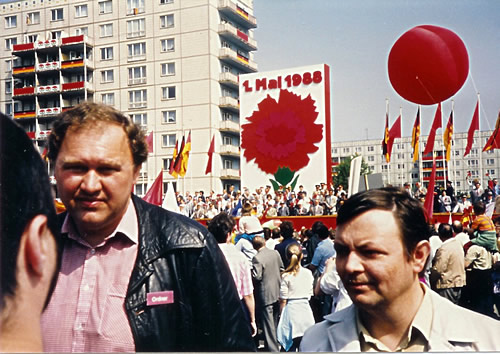15. Monday, September 27
"Marxism: Another Western Version of Modernity"
Reading: The Communist Manifesto, entire pamphlet.
This is one of the most important pieces of political literature in the history of western civilization. Keep in mind that this pamphlet was not only written to edify people but also to move them. Here's how to approach it: Read the introductory paragraphs out loud and with the enthusiasm of a true revolutionary. Then, read sections 1, 2, and 4 at least three times and as closely as possible.
Try to figure out why intelligent people were enthused about the Communist Manifesto, indeed sufficiently enthused to sacrifice their lives for its authors' cause. Clue: When was the Manifesto written? How might it matter when and where different types of revolutionaries read it?
16. Wednesday, September 29
"The Unanticipated Foundations of Revolution"
Reading: (CR) R. Tucker, “Marxism and Modernization.”
Robert Tucker is one of the most influential students of Marxism-Leninism in the Twentieth Century. Why does he think the communist era can't be understood without factoring in the Russian past? What lessons can you discern by comparing the Russian exerience with the contrasting development of liberalism in the West?
17. Friday, October 1
Discussion #6: Why is The Communist Manifesto really about us? Which of its ideals remain alive in the contemporary West?
Listen: The Internationale
18. Monday, October 4
"Leninism: A Modern Political Weapon"
Reading: (CR) Josef Stalin, Foundations of Leninism, selections
19. Wednesday, October 6
"Stalinism: The Real Horrors of Leninist Dreams"
Readings:
(CR) Rothman and Breslauer,“Stalin’s Russia,” pp. 36-42.
(CR) Ginzburg, excerpts from Journey into the Whirlwind
I'm not sure that it's possible for any writer or lecturer to capture the horrors of Stalin's terror, let alone convey the reality of the experience to people of another age. But as someone who suffered through the period, Ginzburg brings us close. Try to imagine what a Stalinist regime would look like in our times. Would it be possible?
20. Friday, October 8
Discussion #7: Was Stalinist horror inevitable? Did it require a certain historical context? What about the role of leadership: Do you need a Stalin for Stalinism to occur?
21. Monday, October 11
"Marxism-Leninism: A Credible Challenge to Liberal Democracy"
Reading:
(CR) Havel, “Power of the Powerless”, pp. 36-62
Read: Havel's life
There's much to fault about all of the former (and current) communist states. But, why did millions of people support them? Why did it take so long for prophecies of crisis, like Havel's, to come to pass? Would you have stood up to "authority" if you had been in Havel's situation? Or would you have just sought to retreat into your private life?
22. Wednesday, October 13
Film II: “A Journey to Russia”
This In-Class Film starts promptly at 9:35. Be sure to arrive on time.
23. Friday, October 15
Discussion #8: Leninist Stability and the Pretense to Legitimacy. Some people say they weren't surprised by the collapse of the majority of communist regimes in 1989. Balderdash.
MID-TERM BREAK: October 16-24 |
24. Monday, October 25
"Leninist Problems suddenly become Leninist Crises"
The big issue here is how you go from undeniable problems to systemic crises. There were always significant problems with communist regimes, even the more successful ones. But what made these faltering regimes abruptly unsustainable? Consider this metaphor: all individuals have problems, but they don't necessarily always have crises.
Readings:
(CR) Black, Rebirth, et al., pp. 276-291
(CR) Havel, “Power of the Powerless,” pp. 62-122
Scan: Tribute to Gorbachev
This interesting site treats Gorbachev like a saint, when he was merely a normal human being. But given what transpired under his reign, how could he complain?
Here is ESSAY ASSIGNMENT #2.
25. Wednesday, October 27
"Beyond Leninism: Is there really a New World Disorder?"
Reading: (CR) Colton and McFaul, “Russian Democracy under Putin”
After the fall of the communist regimes of the former Soviet bloc, western experts rejoiced at the possibility of creating new and vibrant democracies. After a short while, others prophecied that the hopes for liberal order would be dashed with the reality of authoritarian disorder. Where are we now in this debate?
26. Friday, October 29
Discussion #9: Gorbachev’s and Havel’s Dreams. What did Gorbachev and Havel dream about? Were their dreams exactly what you would have expected? Was either figure a classical liberal? Look carefully.
top
